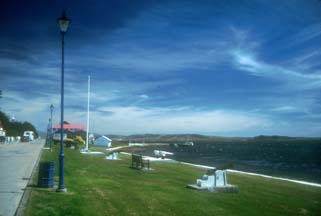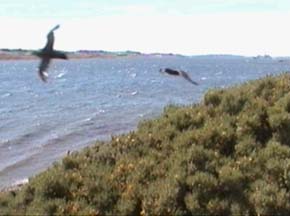
(Click on any image below for a larger version)
Saturday, January 20: Port Stanley, Falkland Islands
I changed into dry clothes for the cruise to Port Stanley, a few miles to the south of Volunteer Point. The morning was sunny and the wind was increasing. It was blowing about thirty miles per hour and kicking up white caps as we passed the lighthouse on the point leading into Port Stanley.
 The
entrance to the harbor is very narrow. As the Hanseatic turned
toward the dock inside the harbor, the wind picked up even more.
It was blowing more than 45 miles per hour, and gusting more than
that. Most of the expedition passengers on the observation deck
took shelter behind the electronics shack in the middle of the
deck.
The
entrance to the harbor is very narrow. As the Hanseatic turned
toward the dock inside the harbor, the wind picked up even more.
It was blowing more than 45 miles per hour, and gusting more than
that. Most of the expedition passengers on the observation deck
took shelter behind the electronics shack in the middle of the
deck.
Two of the ship's tenders were used for the landing at Port Stanley. They doubled as lifeboats. The ship was equipped with four tenders. They were completely enclosed for arctic operations. We watched as boxes of fresh vegetables were unloaded from one of the tenders and then charcoal from the ship was placed in the tender to be taken on shore in trade.
Link to a page describing Port Stanley.
Debbie and I rode in the tender to the dock at Port Stanley. We planned to find a restaurant to have lunch.
 First we walked down Ross Road, the street that
fronted the harbor.
First we walked down Ross Road, the street that
fronted the harbor.
 This stone house that dates to 1887 sits across
Ross Road from the dock at Port Stanley.
This stone house that dates to 1887 sits across
Ross Road from the dock at Port Stanley.
We passed the police station and found the post office. There was a hand written sign on the door of the Post Office to the effect that it would be open for an hour in the afternoon for ship's passengers to buy stamps.
 Christ Church Cathedral sits across the street from the harbor.
In the garden in front of the church there is a large archway
made from the jawbones of a Blue Whale. The arch stands nearly 20
feet tall.
Christ Church Cathedral sits across the street from the harbor.
In the garden in front of the church there is a large archway
made from the jawbones of a Blue Whale. The arch stands nearly 20
feet tall.
Link to the Christ Church Cathedral web page.
 A large monument to the 1982 battle
for the Falklands Islands stands a short distance past the
church.
A large monument to the 1982 battle
for the Falklands Islands stands a short distance past the
church.
Gordon Smith's book Battles of the Falklands War can be read on-line.
 Giant Petrels rode on the ridge lift from the
high winds blowing over the jetty at Port Stanley Harbor
Giant Petrels rode on the ridge lift from the
high winds blowing over the jetty at Port Stanley Harbor
There is little wood available for construction in the Falkland Islands. The roofs of the houses were made mostly of sheet metal. The metal roofs were painted in bright colors, lots of red and green and some yellow and blue.
 Thatcher Drive is a one-way street.
Thatcher Drive is a one-way street.
 Glassed in sun rooms are a popular addition to many of the homes.
This is the Governor's House.
Glassed in sun rooms are a popular addition to many of the homes.
This is the Governor's House.
 Another monument commemorates the
British victory over the German fleet near the Falklands in 1914.
Notice that the owners of the duplex in the background have
chosen to paint each half of the roof a different color.
Another monument commemorates the
British victory over the German fleet near the Falklands in 1914.
Notice that the owners of the duplex in the background have
chosen to paint each half of the roof a different color.
These monuments are illustrated on the Falkland Islands Government History Page.
 Range Rovers are definitely the most popular car in Port Stanley.
Range Rovers are definitely the most popular car in Port Stanley.
 The wreck of the Jhelum sits grounded in the
harbor. It has been there since the 1870s. A tin roof has been
installed on the wreck to slow its deterioration. It is
considered one of the most important wooden shipwrecks in the
harbor.
The wreck of the Jhelum sits grounded in the
harbor. It has been there since the 1870s. A tin roof has been
installed on the wreck to slow its deterioration. It is
considered one of the most important wooden shipwrecks in the
harbor.
Link to a page describing the wrecks of Port Stanley Harbor.
We hiked up the hill and crossed back through the residential part of town. Many of the homes had carefully tended gardens.
 One of the yards featured a remarkably ornate collection of
ceramic garden gnomes. The yard was tiered. The lowest tier of
the garden was occupied by dozens of garden gnomes. There was a
ceramic Mexican burro and a pair of plastic, pink flamingoes
behind them. Farther up, there were a couple of species of
ceramic geese. A large shrub in the highest tier was surrounded
by a collection of ceramic Gentoo Penguins and topped by a
ceramic hawk.
One of the yards featured a remarkably ornate collection of
ceramic garden gnomes. The yard was tiered. The lowest tier of
the garden was occupied by dozens of garden gnomes. There was a
ceramic Mexican burro and a pair of plastic, pink flamingoes
behind them. Farther up, there were a couple of species of
ceramic geese. A large shrub in the highest tier was surrounded
by a collection of ceramic Gentoo Penguins and topped by a
ceramic hawk.
 Cross your eyes to see the gnome garden in 3-D.
Cross your eyes to see the gnome garden in 3-D.
We stopped in the Globe Tavern to see about getting something to eat. The proprietors of the Globe Tavern are Julie-Anne Clarke and Carmen Miranda. The air in the tavern was thick with tobacco smoke. A group of sailors with a case of Heineken occupied the central table. The CD jukebox was being repaired. The repairman had opened it up, and its works were spread on the floor in front of it. We decided to get something to drink and then to go somewhere else to eat. I ordered a Guinness Stout and Debbie had a Heineken.
Get the Straight Dope on why bubbles in Guinness Stout "float" down.
After we finished our drinks we went to find some food. Everywhere we looked, the restaurants were closed, or had just stopped serving food. Eventually, Debbie decided to visit the town cemetery, and I headed back to the Globe. The Globe had a menu written in chalk on a black board. I ordered a steak and kidney pie and another Guinness.
I sat at a table with my Guinness stout to wait for my pie. A member of the Caltech contingent, who had been a student there about ten years before me, ordered some lunch and sat at the same table. A short while later a waitress with lots of metal bits piercing the thinner parts of her anatomy brought his order of chicken curry to the table. I mentioned that a steak and kidney pie should also be on the way. She replied that there wasn't one. She went to the counter and spoke to the bartender. She came back and told me that they had run out of the steak and kidney pie. I'm not sure if they ever would have mentioned that my pie wasn't coming. I changed my order to the chicken curry. It was a fairly ordinary curry with just meat, no vegetables or any of the extra condiments I usually use to augment my own curry.
I found Debbie on the dock waiting for the tender. She had found many interesting old graves in the cemetery, lots of shipwreck victims and some families that had lost several children over the space of a few weeks, as if there had been some epidemic.
Dad and Elaine invited Harrison Schmitt and his wife Theresa to join us for dinner that night. The next morning we would be at sea, crossing the Drake Passage, so we did not have to get up early to prepare for a landing.
 Table of
Contents
Table of
Contents Send a message to Brian.